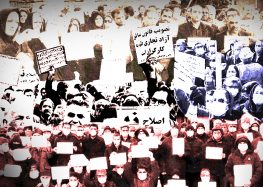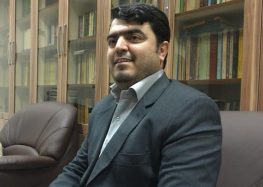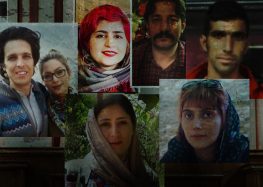Imprisoned Teacher Begins Hunger Strike to Protest Years Behind Bars for Peaceful Union Activities

Mahmoud Beheshti Langroudi, a teacher and activist who was sentenced to five years in prison and an additional four-year suspended prison sentence during a trial that lasted less than eight minutes, has been on hunger strike since April 20, 2016 in Tehran’s Evin Prison to protest “the tyrannical sentence issued by the Revolutionary Court,” a source told the International Campaign for Human Rights in Iran.
“I will go on a hunger strike and refuse everything except water, tea, sugar and salt until my sentence is terminated and a public trial is held based on Article 168 of the Constitution,” wrote Beheshti, a teacher for 25 years, in a statement published on the Teachers and Workers Rights website (Hoghooghe Moalem va Karegar) on April 20, 2016.
“If anything bad happens to me during or after the hunger strike, the responsibility will be with those who are silent or indifferent towards my demand for justice,” he said.
The source told the Campaign that Langroudi’s family is worried because he has already become extremely weak from undergoing several hunger strikes in the past year.
“Mr. Beheshti Langroudi has committed no crime other than trying to improve conditions for students and teachers,” said the source. “That’s why he has been sentenced to so many years in prison.”
Langroudi was sentenced to five years in prison in June 2013 for “colluding against national security” and “propaganda against the state” by Judge Abolqasem Salavati of Branch 15 of the Revolutionary Court. He was also issued the four-year suspended prison sentence.
“According to current laws, especially Article 27 of the Constitution, I do not consider any of my activities to be crimes. But even if we assume I committed a crime, Article 168 of the Constitution states that good-intentioned violations of the law should be prosecuted in the open and in the presence of a jury,” said Langroudi in his statement.
“But due to official procrastination, this progressive principle has been held up for the past 37 years, and instead they have been illegally dealing with such cases in the Revolutionary Court behind closed doors, sending many innocent people to prison with tyrannical sentences.”
Labor leaders are vigorously prosecuted in Iran under catchall national security charges, and independent labor unions are not allowed to operate. Langroudi was the former spokesperson for the Iranian Teachers’ Trade Association.
Langroudi has publicly protested his trial, especially the fact that it ended within eight minutes.
Judiciary Spokesman Gholamhossein Mohseni Ejei denied that a trial could be that short in a comment to the hardline Fars News Agency in December 2015: “It’s absolutely not true or possible for court proceedings to end after five minutes and issue a verdict.”
But on December 14, 2016, the day after Ejei’s comment was published, Langroudi’s son, Abouzar Beheshti, described his father’s trial as lasting “five to eight minutes” and “three minutes of it was the judge making threatening statements.”
Esmail Abdi, the secretary general of the Teachers Association of Iran, and Jafar Azimzadeh, the president of the Free Workers Union of Iran—both of whom are serving time in Evin Prison—meanwhile issued a statement announcing that they would also go on hunger strike on International Labor Day (May 1, 2016).
A source close to Abdi confirmed the hunger strikes to the Campaign and said the goal was to protest against Iran’s criminalization of organized labor gatherings, the conviction of labor activists on trumped-up charges, wages below the poverty line, and the ban on International Labor Day and Teachers Day celebrations.
In the days leading up to International Labor Day (May 1, 2016), activist-teachers from several unions were warned by the Ministry of Intelligence not to participate in any Labor Day-related activities, the Campaign learned from a source close to the teachers’ union.
Peyman Haj-Mahmoud Attar, the lawyer for the Teachers Association of Iran, criticized the Revolutionary Guards’ Intelligence Organization for its approach to lawful labor activities, in an interview with the Campaign on October 27, 2015.
“All the detained members of the Teachers Association were carrying out their lawful duties under permits issued to professional unions by the Interior Ministry. One of their duties was to work towards improving teachers’ welfare,” said Attar. “But the Revolutionary Guards’ Intelligence unit has branded all these completely legal activities as threats to national security.”






